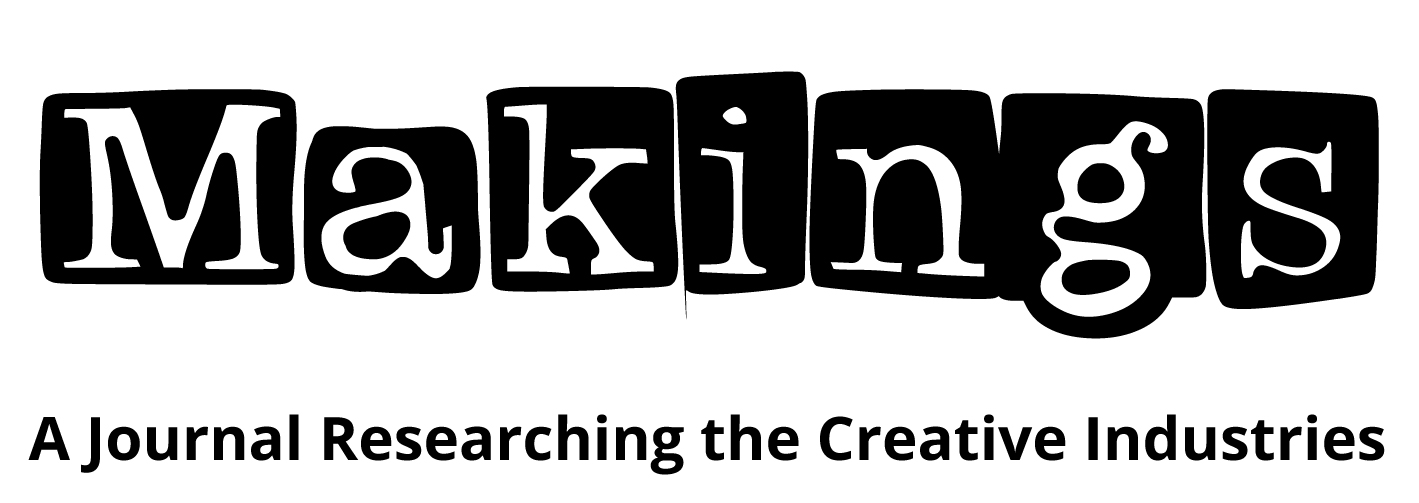
Gentle Gestures: contexts, spaces and approaches in and beyond the academy
Download the PDF of this article
Editorial note
Thanks for reading this special issue of Makings Journal, edited by Gentle Gestures. Following on from Makings Journal 4:1, ‘Creative Higher Education: Curriculum and Pedagogy’ (2022), this issue thinks about education’s relationship to creativity beyond formal educational infrastructures. Titled ‘Gentle Gestures: contexts, spaces and approaches in and beyond the academy’, this issue aims to consider how informal, alternative, fluid or gentle positions of learning (re)articulate where, how and with whom education can happen.
This issue explores spatial, peer-led, and nomadic sites of learning in relation to creative work and precarity; the role of critical pedagogies in creative action and learning across Art, Design and Media; and the influence of these para or alternative practices in relation to existing academies. Articles address the polyphonic, the non-human, the wider role of engagement policies, and the production of collaborative projects. They consider who has access to learning, what non-institutional structures afford creative activity and social action, and what the neoliberalisation of creative practice has done to how we imagine learning in studios, communities, para- and formal educational settings.
The journal is made up of three types of responses to the open call: Traditional academic papers (approx. 4000–5000-word papers), practice-led papers (1500–2000-word papers), and studio submissions (think pieces and media-only works). The Journal does not maintain a hierarchy around these research types, situating them instead as multiple entry points that invite a wider group of creative practitioners into engagement with the queries of this issue of Makings.
Care: Relational and Specific
The first three provocations talk through care and the wider institutional impacts. Alex Parry’s ‘Making futures in crisis times: the art workshop as rehearsal for relational structures and feminist post-capitalist futures’ reflects on how a socially engaged artist may use art workshops within different contexts in the neoliberal paradigm, as a form of politics to prefigure relational care for collective futures entwining the dialogical, organisational and material. This is followed by Jo O’Brien and Sunny Nestler’s ‘What We Need to Be Here,’ which is a practice that develops access-oriented pedagogies by critically examining neoliberal universities, as questions of access are often bifurcated into medical-legal accommodation procedures and top-down approaches. Sunshine Wong shares the exasperations of care in particular, and its imbrication with what they term “socially negotiated art” in their essay ‘Barely caring: art, care and the end of the world.’ And finally, the carefully balanced research and practice of Hannah Clarkson poses the question “How does one dress up—get ready—for a day in the life of a chronically ill body?” in ‘Getting Ready (for a Night Out with the Girls)’. Clarkson’s paper takes the reader through her live work from 2022, and how the performative gesture explores the impacts of chronic autoimmune disease towards playful forms of resistance in times of body crisis.
Voice, Hearing, and the More-Than-Human
Aiming towards a conversation-led practice, Gayle Meikle and Alexandra Ross explore the nature of collaboration and mediation in ‘A Polyphonic Essay on Curatorial Polyphony’. Moving from the (poly)vocal to the (poly)phonic, they acknowledge the many actors and agents at play when encountering practice and, in doing so, destabilise the authoritative roles experienced within neoliberal approaches. This complements Lukas Lund’s ‘Breathing as a Gentle Gesture’, which takes us through a fragmented transcription of a conversation for listening as a research method, in which the absence of material encourages speculative knowledge, asking “How may we think-with listening as a gentle gesture, a generative mode of learning, a sensitive and co-dependent pedagogy, and an engaging explorative artistic practice, all at once?” Giulia Astesani’s ‘The Radical Potential of Listening and Speaking’ presents an audio recording of the performance ‘Thoughts in Transit. Reflections on Writing, Feminism and Bad Habits’. This documents a live intervention at the London Conference in Critical Thought (LCCT) Gentle Gestures stream in 2023. Alongside six performers, five live and one via a previous recording, this performance lecture drew from a genealogy of feminist and lesbian histories, pondering on the material condition of knowledge production in academia and the precarity of the university.
Mareike Nele Dobewall’s ‘nature-learning’ guides us through her artistic method of thinking-with nature patterns. An experimental, curious and affective approach that has innovated her conception of music and notation techniques through exploring knowledge production in collaboration with the more-than-human, and awe as a way of knowing the world. Jessica Santone examines the work of New Orleans-based artist jackie sumell in ‘Learning With and From Plants In Growing Abolition’. Growing Abolition is an ongoing public pedagogy project demonstrating how plant life offers metaphors and models for the dissolution of the prison industrial complex. Santone analyses sumell’s collaborations with particular attention to garden-based art projects, using critical pedagogical approaches to broaden understanding of the intersections of ecological knowledge and abolitionist practices.
Localities, Communities and Co-Making
Through differing community contexts, Andrew Wilson’s ‘100 People: A Portrait of Co-Existence’, Laura Onions’ ‘Gathering Press: Towards Environmentally Resonant Pedagogies,’ and Alis Oldfield and Christina Boreland’s ‘Carrying the Craft’ consider the ability of artistic practice to support wider community engagement. Wilson seeks to clarify and contextualise collective tendencies through his community archive project ‘100 People’ in the neighbourhood of Shieldfield, Newcastle, UK within a broader framework of resistance to identify the need for a more collective approach to storytelling. Onions considers the ongoing cartography and emerging pedagogies of ‘Gathering Press’, a roving screen-printing project moving within the Black Country, West Midlands, UK. The text considers the inter-relations between people, place and making, drawing upon feminist geographers and educators. Oldfield and Boreland offer an insight into ways of making and learning collaboratively through ‘Carrying the Craft’. Through spinning, felting, wild-clay work and machine knitting, they explore craft-based making as both research and non-hierarchical, pedagogical methods. These approaches complement the work studied through Emeri Curd’s detailed examination of the work of Heart of Glass, who explore a collective approach to learning, research and knowledge production with artists, communities, groups, partners and producers. All of these papers question the role of active collaboration in the creation of community art and creative spaces.
Gentle Gestures
‘Gentle Gestures’ is an invitation to inquire into submerged, fugitive practices of gentle change within pedagogical environments and approaches, beyond the now increasingly strained ideas of practices of care. Researching across creative practices, practice-based research and critical theory, Gentle Gestures aims – through a loosely held collective of people thinking alongside one another – to explore the ways knowledge production is embodied, pleasurable, multiple, empowered, navigated, inflicted and shared. This special issue seeks to offer an expansive container for researchers working in kinship or proximity to these interests and approaches.
Following an initial meeting in 2022 at the London Conference of Critical Thought, the core group of Gentle Gestures – artistic researcher Anouk Hoogendoorn, artist and convenor Sophie Mak-Schram, artistic researcher and lecturer Roshana Rubin Mayhew and artist, lecturer and curator Paul Alexander Stewart – have been exploring the notion of the invite in relation to their collaborative and collective working practice. This has led to the development of three symposia streams, a research group of over thirty members (initially convened as part of the Society for Artistic Research (SAR) Artist Pedagogy Special Interest Group), and a book chapter investigating Gentle Gestures as a curatorial approach.
The invite is a starting point or open letter to engage others in this ongoing inquiry into what gentle gestures are, how they take place and the conditions that necessitate them within the sites of knowledge production and dissemination.
Through this special issue of Makings Journal, a plurality of gentle gestures begin to emerge through the experimentation, teaching, and learning practices of those who have contributed. We hope this prompts a further invitation to you as the reader to continue thinking alongside the many voices you will come across in the following pages.
Gentle Gestures
Anouk, Paul, Roshana and Sophie
